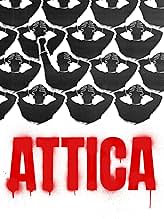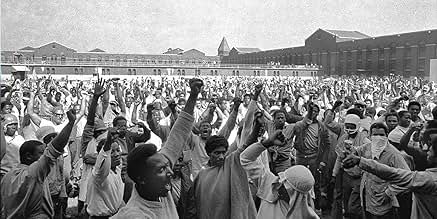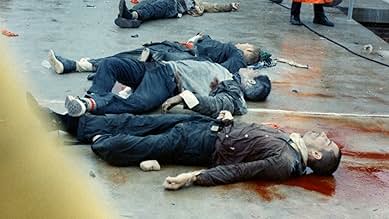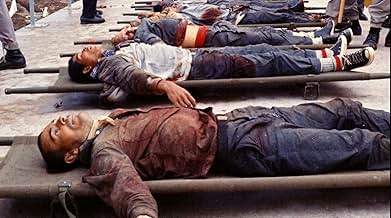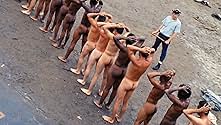Un tuffo straziante e vivido nella rivolta del 1971 che getta nuova luce sulla violenza e il razzismo persistenti nel sistema carcerario e che richiede una riforma urgente e continua cinquan... Leggi tuttoUn tuffo straziante e vivido nella rivolta del 1971 che getta nuova luce sulla violenza e il razzismo persistenti nel sistema carcerario e che richiede una riforma urgente e continua cinquanta anni dopo.Un tuffo straziante e vivido nella rivolta del 1971 che getta nuova luce sulla violenza e il razzismo persistenti nel sistema carcerario e che richiede una riforma urgente e continua cinquanta anni dopo.
- Regia
- Sceneggiatura
- Star
- Candidato a 1 Oscar
- 2 vittorie e 14 candidature totali
Recensioni in evidenza
Stanley Nelson and Traci Curry's exemplary documentary does a thorough job of telling the full story. It's not just a recitation of facts, either, the filmmakers do excellent work in showing how the small upper state New York that housed the prison was a true 'company town' - the corporation being the state pen. Current day interviews are presented from many who participated (including multiple prisoners) and the families of those who aren't here to tell their story (especially the guards).
Fortunately for the filmmakers there is ample footage, not just from newsreels, but, quite a bit from inside the prison. The prisoners made the wise P. R. choice to allow the media inside the prison walls in order for their side of the story to be told. The most chilling footage is from Attica's security cameras. They sit silently capturing all of the events without moving or editing. Just observing.
What's most striking about the early part of the Documentary is how articulate the prisoners were (and are). Their pleas for fair treatment by officials is passionate and well thought out (one of their number, nicknamed 'Jerry the Jew', was an actual lawyer). The sense that they were finally being heard is palpable. There was even some optimism.
All of this, adds to how painful the final act plays out. Even with some hope expressed early on, one knows how it all turned out. The villains here are then Governor Nelson Rockefeller and President Nixon (who not only expresses support for Rockefeller's actions, but goads him on). The surveillance footage is truly horrific. The police's repeated exhortations to the prisoners to surrender and "you'll all be safe" are just as heartbreaking five decades later.
Nelson and Curry do mention that some reform did come out it, but, it took far too long, as did any king of recognition and compensation to the guards who became the pawns in the tug of war. ATTICA isn't just a 'history lesson' - it's a vital document that resonates.
And what were they insisting on? "Let's give equal weight to abuse and racism." Give equal weight to little medical care, denying right to practice religion, even petty abuse like one roll of toilet paper a month. Give equal weight to the fact that all guard deaths were by friendly fire by incompetently planned attacks.
Some of it is remarkable, white prisoners admitting they got favored treatment. This is the most insightful of the Attica documentaries or films based on the hostage crisis.
Attica is one of the better journalistically sound docs I've seen in the last ten years. It's about the 1971 uprising at the Attica Prison in New York State that shined a spotlight on the brutal conditions inmates endured, but ultimately resulted in a massacre.
The recollections from former inmates, government officials, family members of guards, and journalists do most of the groundwork here. But, there's a massive amount of arrival footage including horrific images of the aftermath that leave indelible conclusions about what happened.
In the end, what happened is that there's a lot of blame to go around for what went wrong.
And, without directly commenting on it, documentarian Stanley Nelson Jr.'s film also points out that 50 years later much work at improving race relations needs to be done.
Couple of comments: this is the latest from Emmy-winning and veteran documentarian Stanley Nelson ("Freedom Riders"). The documentary opens with talking heads, as there wasn't archive footage of the situation until local (and later national) TV stations started covering the events. When watching a documentary like this, there are 2 separate aspects: the underlying events giving rise to the documentary, and whether the documentary itself is any good. As to the underlying event, let's be clear: this is unbridled white power abuse (and worse), pure and simple. If you object to the term "white power", well it's actually uttered by a New York state trooper at the Attica scene, right then and there, with a smirk on his face and without any awareness that, you know, this may not be the best thing to say out loud. But no, he doesn't care one bit. One might expect such scenes to come from the South African apartheid regime, but this really happened right here in the US, a mere 50 years ago. As to the documentary itself: the initial 90 min cannot prepare you for what you will see in the last 30 min of the film. Nelson and his team have painstakingly gone through the archive TV and film footage, and it is a veritable treasure trove on one of the most sickening events in the modern history of this country.
"Attica" premiered at the Toronto International Film Festival on 9-9-21, exactly 50 years after the Attica prison riot started, to immediate critical acclaim. The documentary recently premiered on Showtime, and is now available on SHO On Demand (where I saw it), Amazon Instant Video and other streaming platforms. If you need a reminder as to how unbridled white power has functioned in US history, you can do a lot worse than seeing this documentary, Of course, don't take my word for it and hence I urge you to seek out this film, and draw your own conclusion.
Lo sapevi?
- QuizIn 2022, the film was selected for preservation in the National Film Registry by the Library of Congress as being "culturally, historically, or aesthetically significant".
- Citazioni
Self -- Former Attica Prisoner: You either shut your mouth, or you were in big trouble. Some people died. Some were crippled. Some were psychologically damaged for life. And, uh, it was a bad place to be.
- Curiosità sui creditiEnd credit title card #1: "29 prisoners and 10 hostages died in the assault on Attica prison. All were killed by law enforcement."
- ConnessioniFeatured in La 94a edizione degli Academy Awards (2022)
I più visti
- How long is Attica?Powered by Alexa
Dettagli
- Tempo di esecuzione1 ora 56 minuti
- Colore
- Proporzioni
- 1.78 : 1
Contribuisci a questa pagina



